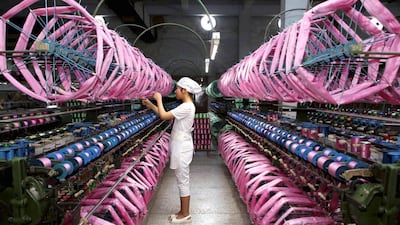After a stellar year for regional equity markets, many Middle East investors are increasingly showing preference for fixed-income asset management products that do not rely on bonds alone, Schroders Investment Management said.
Iain Cunningham, one of the managers of Schroder ISF Global Multi-Asset Income fund, who met clients in the UAE over the past week, said that investors here want sustainable income from such funds because of concern that if interest rates rise, bond prices will be hurt.
“The fund was designed to create solutions for investors who have been struggling to generate income in a low-yield environment,” said Mr Cunningham. “And due to that challenge, we’ve seen the fund grow from zero assets in April 2012 to just over US$4 billion. We can go across regions and across sectors. The fund was designed to deliver a 5 per cent payout to investors on annualised basis with focus on sustainability of income.”
Mr Cunningham said his fund currently has a preference for developed market equities, favouring mature technology companies in the United States and financial services firms in Europe and underweight on emerging markets where countries have been hurt by the tapering of US monetary stimulus.
There are some opportunities in emerging markets that are interesting, such as Mexican government bonds, Mr Cunningham says, but on the whole he doesn’t see much that encourages him.
“We believe that developed markets will continue to do relatively well while emerging markets do less well,” he said. “We believe emerging markets will do less well because of two factors. One the Federal Reserve is withdrawing liquidity from the market which some emerging market nations have been beneficiaries of in the past five years, and the Chinese economy is undergoing reform and transitioning.”
It is no coincidence that Schroder’s global multi-asset income fund is one its fastest growing funds, for its investment thesis has echoed across Wall Street of late.
Many big investment banks such as JPMorgan are advising clients to remain underweight on emerging assets and focus on quality names in developing markets after a global sell off in January.
“Contagion into developed markets should be limited but economic contagion could be severe into emerging markets,’’ analysts led by Jan Loeys at JP Morgan wrote in a report last week. “We stay broadly underweight in emerging markets, but remain long developed market assets.”
The benchmark MSCI Emerging Markets Index fell 1.4 per cent last week and 6.6 per cent in January. The measure has been sliding amid a contraction in Chinese manufacturing, US Federal Reserve monetary stimulus cuts and political unrest in countries such as Ukraine, Thailand and Turkey.
While many analysts do not see a big risk of protracted global contagion, the financial markets of what Morgan Stanley has dubbed the fragile five – Brazil, India, Indonesia, South Africa and Turkey – because of their big current account deficits are likely to continue to lead further declines in emerging markets.
It is only really if China’s economy has a hard landing that a massive global sell-off could be precipitated, they say.
mkassem@thenational.ae

